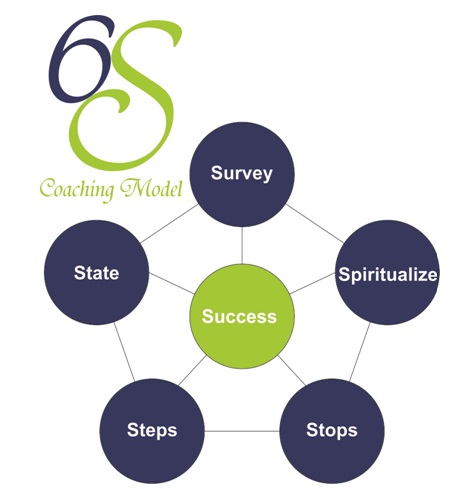A Coaching Model Created by Sherri Lojzer
(Women’s Leadership Coach, CANADA)

The most important thing about goals is having one. Geoffry E. Abert
State
State your goal in clear and concise terms and know what the desired outcome is.
Helping clients get really clear about their goals so that they understand the exact details. Whether it is to achieve self-improvement in time management, communication, conflict resolution or starting a new project, it’s important to clearly define the goal in SMART terms.
Methodology:
Values and Vision exploration with a client at this stage is key in helping to clarify what’s important to them and where they want to go with their business or their lives. Balancing out areas that are neglected or expanding can be key goals. Exploring in this stage can be simple or complex. Sometimes clients will have an idea about what they want but not sure how to formulate the goal around it. Other times, it could be an incredibly clear and grand goal and really requires breaking it down into smaller goals or milestones. Enabling a client the time and space to give this shape and definition is key in ensuring that the client has fully formulated a direction to judge against for success or completion.
Motivation is a fire within. If someone else tries to light that fire under you , chances are it will burn very briefly. Stephen R. Covey
Spiritualize
Spiritualize the purpose.
Find the why and the motivation in your client. How does it feed their soul & drive them. Developing the connection with their motivation and tying it back to their vision and values helps them to ignite that fire within.
Methodology:
Begin creating awareness, using CBT techniques to create the rich feelings of desire and drive within, incorporating visualization, mindfulness and powerful listening. What do they love about the goal, what is the effect on them of imagining the accomplishment. Why is it so important? How do you see it changing your business or your life? This step allows the building of the dream in a deeper way that can be valuable in supporting through the difficult stages of achieving the goal. Encouraging the emotional connection enriches the long term impact for the client. Without a true motivation a client may lose commitment and fall away from the path they set out for themselves.
Experience is simply the name we give our mistakes. Oscar Wilde
Survey
Survey the techniques, attempts and trials of the past and present for what works and what doesn’t work.
Methodology:
Use of Socratic questioning, self-awareness & underlying beliefs. What’s the pain of not making the change? Examine current structures and compare for alignment to values and vision. How are they working for you? Are parts of them working? Are the structures supporting other things preventing you from changing them? Acknowledge them for their awareness and willingness to move forward. Create trust to allow the client to really be open about themselves and with themselves. This is not an area to dwell on the negative, but to create awareness around the previously successful and unsuccessful techniques or steps. It also allows for the development of a widening perspective. Perhaps understanding the impact of what they are doing or not doing currently that needs to change, as well as open them up to new options.
A dream written down with a date becomes a goal. A goal broken down into steps becomes a plan. A plan backed by action makes your dreams come true. Greg S. Reid
Steps
What are the action steps to move forward now with more self-awareness and intent? What benchmarks and milestones can the client create to monitor progress along the way?
Methodology:
Supporting the client in creating new structures where they have identified old ones that do not work for them, identifying accountability to themselves and providing accountability support if necessary, assess level of commitment to accomplishing the goal. Creating manageable steps that allow for the acknowledgement and celebrations along the way encourages the client to keep moving forward. The more things they can cross off the list, the more they can gain a sense of accomplishment and continue moving forward.
Giving up on a goal because of one setback is like slashing your other 3 tires because you got one flat. Unknown
Stops
What stops, walls & barriers can be anticipated along the way and how these will be tackled?
Methodology:
Use NLP techniques to examine how a client feels and senses what is happening. Visualization about how a client will overcome and address the anxiety and stress that may come with the experience of encountering the stop. Talk about what it will feel like before during and after so that the experience already feels somewhat realistic. Using appreciative inquiry assess what skill strengths the client has that can help in this step to overcome. Work on broadening perceptions using perceptional positioning to gain insight into the situation more holistically from alternate sources. Evaluate emotional intelligence and how to identify and process emotions during this critical step. Develop and familiarize with current and new structures and how they will work.
What you get by achieving your goals is not as important as what you become by achieving your goals. Zig Ziglar
Success
Acknowledge the success no matter how small and evaluate the results along the way
Methodology:
Gently encourage the celebration asking how do you feel, what’s the payoff, how will you celebrate? Many people don’t acknowledge their successes well and this may seem foreign to them. Take the opportunity however, to solidify the accomplishments and the feelings around them and take advantage of the chance to create NLP anchoring for future challenges.